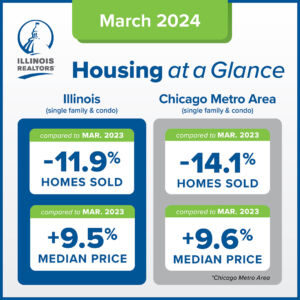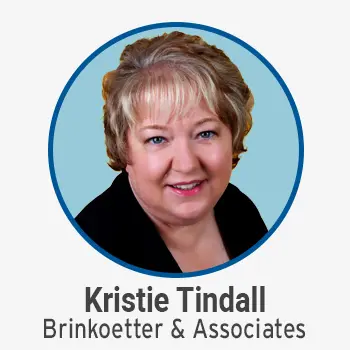Hot on the Hotline: Virtual offices, multiple offers and changing brokerages
Anneliese Fierstos
Illinois REALTORS® Legal Hotline Attorney
Virtual Offices
The pandemic has forced a lot of brokerages to reconstruct their business model and resulted in more and more brokers giving up their designated office spaces. Thankfully, the changes to the Real Estate License Act (RELA), and the newly effective and now published Rules, allow for the use of virtual offices to conduct licensed real estate activities in Illinois. The entire concept is still new and the Legal Hotline is receiving the following question quite often:
Question: How can I set up a new virtual office?
Section 5-45(f) of RELA allows for the use of virtual offices to conduct real estate activities in Illinois. Section 1450.610 of the Rules under RELA provides specific guidance on virtual offices.
A virtual office is a “place” of company business that does not have a dedicated office space or a fixed physical location (often a website). Virtual offices must comply with most of the Rules already in place for physical offices. For example, virtual offices must have their own designated managing broker (DMB) that has been identified to the Department. The Rules also require that a sponsoring broker include any virtual office on the list of offices they maintain with the Department. Finally, virtual offices may not have physical signs, but they are required to comply with all of the advertising guidelines. For example, the home page website content must clearly identify the sponsoring broker’s company name, the DMB in charge, and a list of licensees sponsored through this virtual office website.
In order to operate a virtual office, a sponsoring broker must be able to demonstrate that the licensees associated with the virtual space are:
- Engaging in licensed activities;
- Offering real estate services;
- Holding out to the public they are engaging in licensed activities;
- Maintaining electronic files securely (including escrow records) in same format they were generated, sent or received;
- Making sure secure electronic files can be accessible to Department for inspection;
- Maintaining electronic files related to special accounts for minimum of 5 years;
- Backing up electronic files monthly.
Any virtual office must have the digital infrastructure necessary to facilitate the transaction of business, communications, advertising and real estate services through a virtual office website, URL or other digital platform inviting the general public to transact business. Brokerages should consult with professionals who have expertise in this area in order to establish a virtual office that is functional and secure.
The Rules specifically require that the virtual website, URL or digital platform:
- Be registered with the Division;
- Display a current registry of all sponsored licensees and license numbers (See Rules Section 1450.730);
- Display the city/geographic location and state where real estate services are offered;
- Display contact information for the DMB (name, phone number, email address);
- Maintain a secure intranet or secure portal accessible by employees, independent contractors, licensees and upon request the Division;
- The intranet/portal must include electronic records (including escrow) securely stored in same format they were generated, sent or received.
If a virtual office has more than one DMB, the contact information must be provided for each as well as names /license numbers of the licensees, they each supervise.
It is also important to remember all provisions of RELA apply to licensees operating from a virtual office just as they would to those operating out of a physical office, such as keeping files of required agency disclosures and records of transactions as set forth in Rules Section 1450.755.
Finally, all virtual offices must comply with all advertising requirements under Rules Sections 1450.715 and 1450.720.
Changing Brokerages
Question: I recently changed brokerages and at the time I moved from my old brokerage I had several closings pending. Am I entitled to my commission on those transactions?
Generally speaking, listing contracts and any commission paid pursuant to the listing agreement belongs to the sponsoring broker and not to the licensee. The independent contractor agreement generally describes what portion on the company commission gets paid to the sponsored licensee. IF the independent contractor agreement is silent on the question, there is a good argument that the commissions remain with the company. In some cases, the independent contractor agreement will have a provision addressing what happens to compensation that is paid to a brokerage for real estate activities that a licensee engaged in prior to leaving the brokerage. If there is not such a provision in the agreement, the licensee should try to negotiate for this prior to entering the relationship with the sponsoring broker. Even at the time of separation from the sponsoring broker, in the absence of such a provision, a licensee might try to negotiate with the designated managing broker for payment of compensation for the work they did prior to leaving the brokerage.
Licensees do need to keep in mind that once they leave one sponsoring brokerage and join another, they are not permitted to work with their former clients or attend a closing on their behalf because they are now sponsored by another company and must only work for one brokerage company at any one time. RELA specifically provides for this at Section 10-20(a).
Many licensees contact the hotline to ask if they have the “right” to take their listings to their new brokerage. As stated above, listings belong to the sponsoring brokerage and not to the licensee. Licensees must be cautious about how they discuss their departure from a sponsoring brokerage with their clients, and they should avoid using any language that could be interpreted as an effort to encourage a client to terminate their listing contract with the sponsoring broker. Both RELA and the REALTOR® Code of Ethics specifically prohibit REALTORS® from engaging in any practice or taking any action inconsistent with exclusive brokerage relationship agreements.
A brokerage may agree to compensate a licensee for licensed activity that they performed while with the brokerage after they have joined a new brokerage. Section 10-5(a) of RELA provides that a non-sponsoring broker may pay compensation directly to a licensee sponsored by another or a person who is not sponsored by a broker if the payments are made pursuant to terms of an employment agreement that was previously in place between a licensee and the non-sponsoring broker, and the payments are for licensed activity performed by that person while previously sponsored by the now non-sponsoring broker.
Multiple Offers
The current red-hot, low inventory market has increased the number of multiple offers that sellers are receiving on their properties. As a result, REALTORS® are dealing with a wide variety of complications related to the increase in multiple offers. For example:
Question: My sellers accepted an offer with a contingency clause that the buyer will obtain financing, and they have now received a back-up offer above the asking original asking price that does not have any contingencies. The date is approaching for the proof of financing to be provided and the buyer’s broker for Contract #1 has indicated that buyer #1 may ask for an addendum to the contract for more time to obtain financing. Is my seller able to terminate the contract and accept the second offer that is higher and more secure?
Under these facts, a seller must be cautious about accepting the second offer before they are certain that Contract #1 can be terminated for lack of performance by buyer #1. A listing broker should advise a seller to have seller’s attorney review Contract #1, as well as all correspondence related to the contract, and offer a specific legal opinion whether the contract is voidable. A seller must be cautious because they want to avoid taking any steps that might result in having two contracts to sell one property. If that occurs, a seller could be faced with defending a suit from buyer #1 for specific performance on the contract which could be costly and outweigh any benefit in accepting the more attractive second offer.
Question: I am going to list a home in an area where there is very low inventory and I anticipate a large number of multiple offers on the property almost immediately upon listing. May my seller limit the offers that they want presented in order to only deal with the most competitive offers?
Yes, but take care that the parameters are permissible ones, and are not discriminatory on their face or in effect. A seller might direct the listing agent preferably in writing to present only offers within certain price parameters. For example, they can direct a seller that they will not entertain any offers below a certain amount, and they will not entertain offers with any contingencies, like inspection, financing or appraisal. Once parameters are established they need to be applied consistently. Of course, the seller must avoid establishing any criteria that might be Fair Housing violations. The listing broker should offer the seller guidance on the market trends in the area so that the seller does not establish parameters that are so stringent they actually interfere with the marketing of the real estate.
About the writer: Anneliese Fierstos is the Illinois REALTORS® Legal Hotline Attorney.





 Create professional development programs that help REALTORS® strengthen their businesses.
Create professional development programs that help REALTORS® strengthen their businesses.
 Protect private property rights and promote the value of REALTORS®.
Protect private property rights and promote the value of REALTORS®.
 Advance ethics enforcement programs that increase REALTOR® professionalism.
Advance ethics enforcement programs that increase REALTOR® professionalism.
 Protect REALTORS® by providing legal guidance and education.
Protect REALTORS® by providing legal guidance and education. Stay current on industry issues with daily news from Illinois REALTORS®, network with other professionals, attend a seminar, and keep up with industry trends through events throughout the year.
Stay current on industry issues with daily news from Illinois REALTORS®, network with other professionals, attend a seminar, and keep up with industry trends through events throughout the year.


